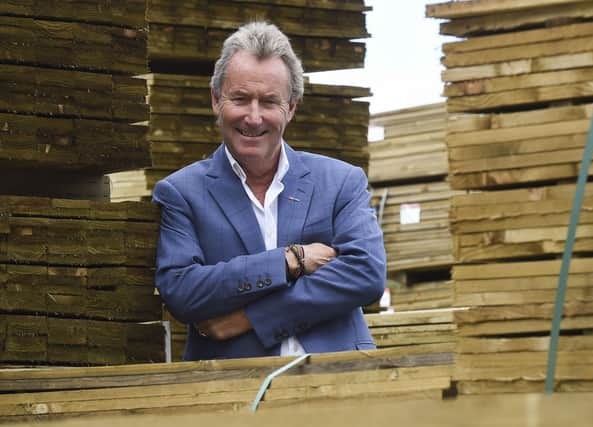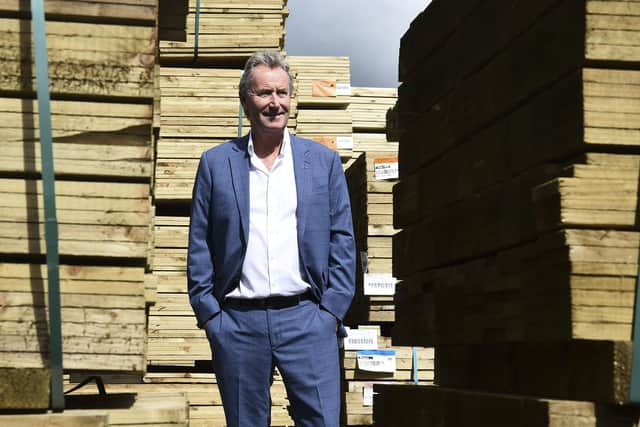The Big Interview: Neil Donaldson, outgoing chairman of James Donaldson & Sons


Neil Donaldson is the outgoing chairman of Glenrothes-based timber specialist James Donaldson & Sons, officially stepping down this Friday. He joined in 1975 and became MD in 1985. The group, which started life in 1860, in June confirmed its senior team, with Neil’s sons Andrew and Michael in charge as chief executive officer and chairman respectively – the sixth generation of Donaldsons to run the family firm.
You are stepping down from the firm after more than 40 years, and have said you are proud to be handing over the reins to the next generation after long succession planning. How do you feel about the transition?
Advertisement
Hide AdAdvertisement
Hide Ad

Someone once told me, “every year you stay on is a year’s experience you deny your successor”, and this is something that resonated with me. And to have both my sons, Michael and Andrew, taking over is the ideal scenario.
Planning the transition from one generation to the next has been one of my proudest moments. It has been very well considered and planned for over the last ten years. We brought in non-executive director George Morris three years ago, with the primary role to oversee the transition. It’s an exciting time for the business, and I am looking forward to seeing where they take it.
Had you always planned to join the family firm?
I never wanted to do anything else. I suppose you could say I have wood in my DNA. I worked for the family business as soon as I was able – driving tractors and chopping wood from when I was as young as 14. When I was 16, I spent a summer in Finland working in a sawmill and I loved it. So, when I first joined the business in 1975, I joined as a sawmiller for a year, before moving into sales.
When you work with something you love, making a product that you love, in a family business where you can develop it into what you think it should be, it is a real opportunity that not many people have. I have been very lucky.
How is Covid-19 affecting James Donaldson & Sons?
On 23 March we held a meeting at 9.30pm and made the decision to temporarily shut – something that hadn’t been done in our 160-year history, including during two world wars. On that day, the short-term outlook was dreadful. We didn’t know how we would survive or how it would affect our customers. However, the government stepped in with furlough options and incentive schemes, and we were fortunate to benefit from this.
It’s clear that some positives have come out of a truly terrible situation. Crucially, we have learned how loyal our employees are. We’re coming out of this as a much more cohesive, stronger unit. We’ve also developed much better communications. With teams across the UK, we’ve historically spent a lot of time travelling for meetings – now we’re having video calls with all employees.
We’ve also discovered – along with most businesses – that for many of our office-based roles, we can work productively from home. I suspect that the business model for many will change dramatically over the next 12 to 24 months because of this.
In terms of trading, we went from £20 million turnover budget in April, to zero, with no pick-up in May. But we’ve seen a dramatic pick-up in June, and we’re hopeful that July will be almost back to normal – which is remarkable.
Advertisement
Hide AdAdvertisement
Hide AdYou have said that the business is very different to the one you started running in 1985 – with milestones including expansion south of the border and acquisitions. Can you give more details on your contribution to the group’s growth?
When I took over in 1985, Donaldson’s was a small business in Fife. Today, the Donaldson Group is made up of seven businesses, operating from 31 sites across the UK.
There have been several significant milestones that led us to where we are today. The first was the development of Donaldson Timber Engineering (DTE) in 1985. We wanted to produce timber roof trusses, guarantee seven-day delivery, and claim 25 per cent of the market share within two years.
It was an aggressive approach, but we invested in the latest kit for the factory in Muiredge in Fife, making it the first of its kind, and we were confident in the product. Within a year we reached our goals, which really shook up the industry.
Expanding the product range into topical areas that fit our portfolio has proved a successful strategy over the years. We got involved in timber merchanting with the purchase of MGM Timber in 2002; with MDF in 2008 when we bought Palgrave Brown; insulation products with Nu Style in 2016; expanded the truss business with Cambridge Roof Truss in 2018; and most recently, we’ve pushed into door sets and kitchens earlier this year, with the acquisition of Rowan Manufacturing and Smith & Frater.
We’ve also benefited from making sales at the right time, such as selling our old Wemyss sawmill site to Sainsbury’s in the late 90s. We’re good at seeing opportunities to grow – as well as when to exit. There have been many temptations to do bigger, riskier deals, but we’ve always resisted. As a family business, we’re fairly cautious, so every decision needs to be very well-considered.
In terms of my personal contributions, I have always tried to respect everybody – shareholders, customers and employees. Our vision, mission and values are the roots of our business and guide every decision we make. These are: customers, integrity, people, sustainability and family.
You attended Harvard Business School – how did this help you and the business?
Advertisement
Hide AdAdvertisement
Hide AdThe main thing was confidence. I spent time with 79 other people, and realised that I wasn’t “just a small business owner from Fife”. I was just as smart and switched on as everyone else on that course, and what we wanted to do with our business was achievable. It also acted as a wake-up call that we needed to up our game. This was in 1994, and I was the only person there who didn’t have an email address.
I came back from Harvard and did some interesting things with the business – including expanding DTE and breaking into timber merchanting. It taught me to think long term and to always consider strategic planning. Setting realistic goals has been an important objective of ours.
Family businesses are a major driver of Scotland’s economic growth. What in your experience are the advantages of this model – and the disadvantages?I mentioned our company values earlier, and I think this is a real advantage, as it’s much easier to have these ingrained in a family business compared to a plc.
The long-term view of the business is also an advantage. We have a vested interest and intention for the business to continue; the CEO is in it for the long haul, not just the short term, so we’re always thinking ten years down the line.
I think, in terms of disadvantages, the key thing is that we don’t have the same access to capital. Plcs have external shareholders, which makes it easier to raise money and to expand.
Which other business leaders do you admire – and why?
The business leader who has had the biggest impact on me is my father, George, who taught me so much about the business; respecting people, and the humility with which the family business should operate. I would also single out Jeff Bezos, CEO of Amazon. He has obviously had a remarkable success, and I like that he is a serial disruptor; trying to change the world. But what really stands out most is that he is most passionate about his customers.
While not a business leader, I also must mention Barack Obama. I was fortunate to meet him once and he is an incredible, inspirational person. What he did for the US in terms of ethnic barriers is amazing.
The business this year celebrates its 160th anniversary – how would you like it to look when it marks its 170th anniversary?
Advertisement
Hide AdAdvertisement
Hide AdMy vision for the business in ten years’ time is for it to continue to be highly respected; to be the go-to company for building products and to have a massive online presence. I obviously hope that it will still be family-owned, and I think it will be even more national than it is today – if not international.
You are also an advocate for the timber industry – what is your outlook for this, and its potential positive impact on the environment?
It’s the most sustainable building product and I strongly believe that we should be using it more. There are still some negative labels that – unjustly – go along with timber, such as fire and rot. But the industry is making huge progress in this area, and I hope that it will be able to be utilised to its full potential.Timber is the world’s only renewable building material; it’s a crop, and it brings so much joy to people.
Whether you appreciate the stunning architecture or the calming tones; working and building with wood brings a significant amount of joy. It is truly one of God’s greatest creations.
A message from the Editor:
Thank you for reading this story on our website. While I have your attention, I also have an important request to make of you.
The dramatic events of 2020 are having a major impact on many of our advertisers - and consequently the revenue we receive. We are now more reliant than ever on you taking out a digital subscription to support our journalism.
Subscribe to scotsman.com and enjoy unlimited access to Scottish news and information online and on our app. Visit https://www.scotsman.com/subscriptions now to sign up. By supporting us, we are able to support you in providing trusted, fact-checked content for this website.
Joy Yates
Editorial Director
Comments
Want to join the conversation? Please or to comment on this article.